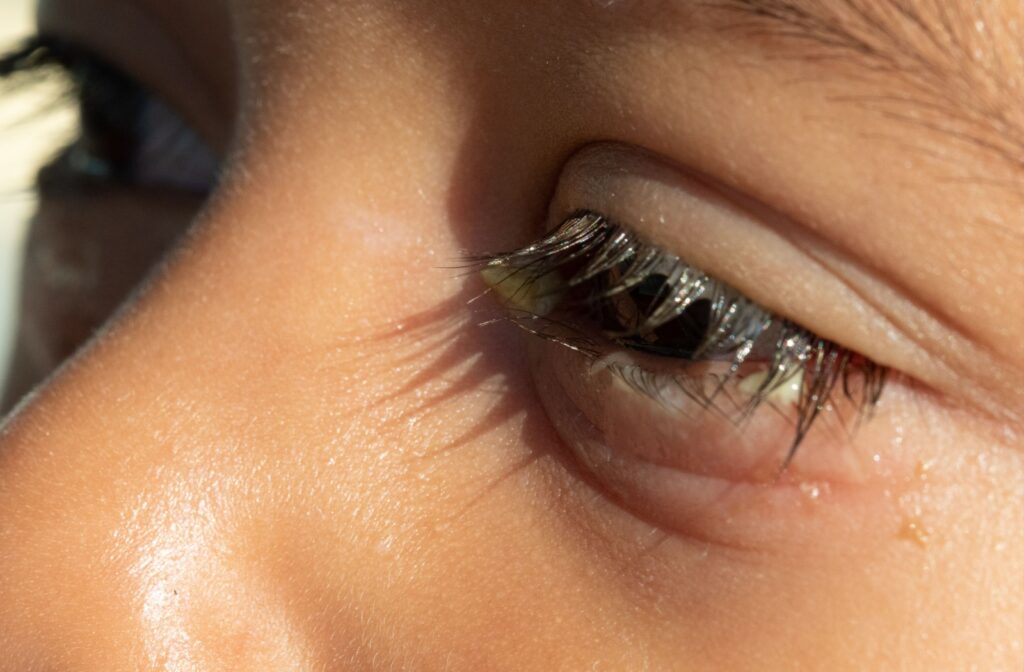Are you experiencing redness, discharge, and light sensitivity in one or both eyes? You may have pink eye, otherwise known as conjunctivitis. Pink eye is common in children, but it can affect people of all ages.
The viruses that cause the common cold often cause pink eye. And because common colds can progress to sinus infections, these conditions are closely linked. This happens because the mucous membranes of the nose, throat, and eyes are connected, making it easier for viruses to spread within the body. Treatments are available for both pink eye and sinus infections; the key is understanding the root cause.
What Is Pink Eye?
Pink eye, known medically as conjunctivitis, is inflammation of the conjunctiva. Your conjunctiva is a thin and clear membrane that covers your inner eyelid and the white part (sclera) of your eye. Infectious forms of pink eye can be very contagious.
Types of Conjunctivitis
Categories of conjunctivitis include the following:
- Viral conjunctivitis is often caused by the same viruses that cause the common cold. You can get viral conjunctivitis after a cold, as the viruses spread through the body’s mucous membranes. This type of pink eye is contagious.
- Bacterial conjunctivitis is also contagious. Caused by bacteria, it may require antibiotics to treat. Bacterial conjunctivitis happens when bacteria from sources like unclean hands or contaminated makeup get into the eye.
- Allergic conjunctivitis is not contagious. It happens when allergens like pollen and pet dander get into the eye and cause irritation. Allergic conjunctivitis can be treated with antihistamines.
- Chemical conjunctivitis is also not contagious. This type of pink eye happens when chemicals like air pollution or chlorine from swimming pools irritate the eye. Chemical conjunctivitis can be a medical emergency if dangerous chemicals are involved.
What Are Sinus Infections?
Sinusitis refers to inflammation of the mucous membranes. Your mucous membranes line the inside of your nose, mouth, and throat.
Sinusitis can be acute or chronic. Acute sinusitis is usually caused by a virus and often happens after a cold. Meanwhile, chronic sinusitis lasts longer than 12 weeks and is often associated with allergies and nasal polyps.
When inflammation and mucus from a cold fail to drain properly, your sinuses become more susceptible to infection. This can lead to a sinus infection. A sinus infection is considered a complication of the common cold.
Symptoms
If you have a sinus infection, you may experience:
- Facial pain or pressure
- A stuffy nose
- Coughing
- Fever
- Headache
- Toothache
- Breath odour
- Blunted sense of smell
Treatment
How your sinusitis gets treated depends on the root cause. If bacteria are to blame, your doctor may prescribe you antibiotics. Other treatment options include saline nose washes and steroid nasal sprays. Over-the-counter pain relievers and a humidifier can also help relieve symptoms.

How Pink Eye & Sinus Infections Are Linked
Viral pink eye is often caused by the same viruses that cause common colds and sinus infections. Bacteria from your sinuses can also get into your eyes and cause pink eye.
Respiratory conditions and pink eye are linked because the mucous membranes connect your nose, throat, and eyes. Your tears naturally drain into your nasal passageways, so blowing your nose too hard can allow germs to transfer to your eyes. And once infectious conjunctivitis is in 1 eye, it can spread to the other.
More About Infectious Pink Eye
Because infectious conjunctivitis is contagious, it helps to understand the symptoms and how it spreads so you can better protect yourself and others.
Symptoms
If you have pink eye, you may experience:
- Red or pink eyes
- A sticky or watery discharge
- Inflamed eyelids
- Itchiness, burning, or stinging
- Light sensitivity
- Excessive tears
Note that eye discolouration can be caused by something more serious than pink eye, so see a doctor right away if you experience this.
Treatment
If the cause of your pink eye is bacterial, you may be prescribed antibiotics. Be sure to take them exactly as prescribed.
If the cause of your pink eye is viral, antibiotics will not work. Most of the time, viral conjunctivitis resolves on its own, but sometimes optometrists will recommend medications to help you along. For example, steroid eye drops can help prevent the cornea from scarring.
At home, you can relieve symptoms with a cold compress. Just be careful not to share towels with other people because this is how pink eye spreads.
Preventing Spread
Infectious conjunctivitis is very contagious, but there are ways to keep it from spreading around:
- Practice good hand hygiene and wash your hands regularly. Encourage your kids to wash their hands often, too.
- Never share personal items such as eyeliner, towels, and tissues. Never share contact lenses or their cases.
- Thoroughly wash your bedding.
- If you have cold or flu symptoms, avoid touching your eyes.
- Children with viral conjunctivitis should stay home from school until they are no longer contagious.
- If you have pink eye, clean the discharge from your eyes with disposable tissues. To prevent spread between eyes, don’t use the same eye dropper in each eye.
Take Care of Your Eye Health in Langley
Optometrists at Willoughby Doctors of Optometry have experience treating eye conditions like pink eye. We strive to offer a personalized approach to eye care that is kid-friendly and serves our Langley community.
Whether you’re concerned about pink eye or just need a routine eye exam, contact us today to book an appointment.











